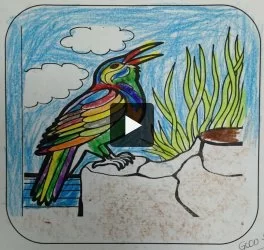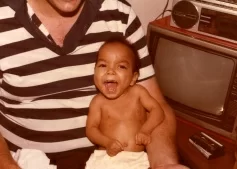 without a thought on my part. But Luke came to my mind yesterday and I looked up some information on him and discovered that his birthday had just passed. I found this old article that I wrote about Luke a few years ago. I thought I'd share it again. I am convinced that there are important and significant lessons we can learn from his life, and that I need to regularly share what I think they are. I hope you enjoy this!
without a thought on my part. But Luke came to my mind yesterday and I looked up some information on him and discovered that his birthday had just passed. I found this old article that I wrote about Luke a few years ago. I thought I'd share it again. I am convinced that there are important and significant lessons we can learn from his life, and that I need to regularly share what I think they are. I hope you enjoy this!The mysteries of God are a part of the Christian life that can often lead to confusion, doubt and even discouragement for believers.
- For some, it's a pride thing. We want to have answers – we want to understand, to be able to grasp the complexities of Biblical truth and God's plan for mankind.
- For some, God's mysteries – the unexplained things of life – are stumbling blocks to faith:
1. Why do bad things happen to good people?
2. Why does He allow pain, suffering and evil to thrive in our world?
Several months ago we were witnesses to the aftermath of the tragedy in Pennsylvania involving the Amish community, where, good, decent, hard working, non violent people were subjected to unspeakable cruelty towards their children. How can this happen?
3. One of our CSC children, who grew up in the worst poverty imaginable in Cebu City, was adopted into a family in the United States several years ago. Well meaning people would tell her how lucky she was and how God obviously had a wonderful plan for her life. She had a hard time with that and would sometimes ask her parents, "But what about all the kids who are still there, who weren't adopted, and who are still suffering and dying? What is God's wonderful plan for their lives? Why me and not them?
For many of us, we celebrate the goodness of God in our lives, we praise him for his healing, for material comforts, for blessing our efforts – even as we observe people who remain sick or disabled, who suffer in poverty – those who efforts and initiatives end in disappointment and ruin.
There are two extremes in terms of people's reactions to the things about God and life that are not understood.
1. There are those who try in vain to grasp the ungraspable – to be able to reduce the mysteries to understandable formulas or explanations. I remember a young seminarian who came to Cebu and who filled the pulpit of our church on a Sunday evening. He preached for an hour on the "peace of God that passes all understanding." Perhaps he felt that if he preached long enough he could crack that nut and open our understanding!
We all know those who have reduced the book of Revelation to precise charts and timetables, giving us easy to understand categories for all of human history and, most especially, the times to come.
2. A second category are those who shake their heads and say, "We'll only know these answers when we get to heaven." They suspend inquiry, not bothering to seek answers to the perplexing questions of life.
Living and working in a Third World country like the Philippines brings some of these mysteries to the front of our lives. Poverty, and all that goes with it, is "in your face." People often ask me "How do you like living in the Philippines?" That's a tough one to answer. Life anywhere has its highs and lows. Some days are great, others are difficult. I often answer this way:
1. When I'm sitting down to a nice breakfast I am aware that, within a few meters of my house are families that have no breakfast.
2. When I'm driving to the office or the Shelter I often pass people walking along the road who, for lack of a few cents can not even afford public transportation and must walk.
3. When I stop to buy medicine for my family or the CSC kids, there are people standing nearby whose children are dying for lack of that very same medicine.
Why am I blessed and they are not?
I recall a conversation with a missionary a few days after Cebu was hit by a strong typhoon. Many of our CSC workers lost their roofs or their entire homes. The houses of the poor were devastated by the high winds and torrential rains. The missionary said that it had been such a miracle how God spared the missionary homes from damage, holding his hands of protection around us during the storm. I remember wondering whether it wasn't more a matter of our having cement houses and strong metal roofs.
Why did our CSC kids have to suffer so much? And how much more, those who live on the street and cannot be admitted to CSC?
These are tough questions. When it comes to trying to understand our own suffering, the Bible gives some answers. For example, Romans 5:3-4 tells us that suffering produces perseverance, perseverance character, and character, hope. And the Bible gives us additional hope that we will someday come to see God's purpose and mysteries:
"But now we see through a glass dimly, but then face to face."
And we hear the testimonies of Christian brothers and sisters who have lived through terrible times and have turned negatives into positives in their lives.
Several months ago I was attending a conference in Bismark, North Dakota. One of the featured speakers was Steve Saint, Steve's father, Nate Saint, was one of the five missionaries killed in 1956 by Aucan warriors in Equador. Steve told about what that tragic day meant to his family, and what it was like when his dad, his hero, didn't come home that day. We saw video of his current family life, and saw a man who was interacting with Steve's children, and who was being referred to as "Uncle." It turns out that this was the very man who had killed Steve's father, who had come to know Jesus and had experienced the forgiveness of God and of the Saint family and now was a part of their family – an amazing story of how good things had come out of tragedy and suffering.
So the clear message is that God has a plan for our lives, we will discover that plan in the right time. He is writing our life's stories, but some of the chapters are difficult ones.
We can understand this. We can, when aided by the Holy Spirit, see how difficulties and suffering are part of a purification process for us, and that we, like Job, will eventually be better people for it.
But what about people who, because of major disabilities, are unable to understand their situation, unable to discern the hand of God or his plan for their lives. Where is the purification and growth and ultimate value for these people? What could God's purpose possibly be?
Back on 1982 a baby was born in a charity ward in a small hospital in Cebu City. 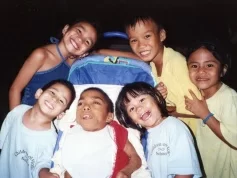 The baby underwent cardiac arrest during birth and was without oxygen for an extended time. Unlike many cases of charity patients, the hospital staff decided to resuscitate the baby, even after he had suffered massive brain damage and cerebral palsy. The baby's mother abandoned him in the hospital, and after a couple months Luke was referred to CSC. When we took him in he appeared to be a bouncing baby boy. We did not know that he would not develop physically beyond about a year and a half, or mentally beyond a few months. Luke would never speak, nor have voluntary movement of his arms or legs.
The baby underwent cardiac arrest during birth and was without oxygen for an extended time. Unlike many cases of charity patients, the hospital staff decided to resuscitate the baby, even after he had suffered massive brain damage and cerebral palsy. The baby's mother abandoned him in the hospital, and after a couple months Luke was referred to CSC. When we took him in he appeared to be a bouncing baby boy. We did not know that he would not develop physically beyond about a year and a half, or mentally beyond a few months. Luke would never speak, nor have voluntary movement of his arms or legs.
Luke became a fixture at CSC. For over 23 years he was an integral part of our lives and a symbol of CSC and what we are all about.
Many times Luke would be hospitalized – often due to upper respiratory infections. He fought for his life many times. There were at least a dozen times when we were sure that he would die. The doctors had told us that he wouldn't make it past five years old. Then they revised it to nine, then 11 – certainly he wouldn't reach his teenage years.
One time, when Luke was critically ill our staff met to pray and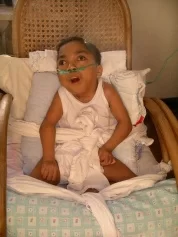 I asked them to reflect on his life. Here is why: I believe that God had a purpose for Luke's life when he created him. I believe that He uses people like Luke to teach us important things. But here is the rub: If we don't spend time reflecting on these lessons, then Luke's life is useless. Its up to us to allow God to make sense of Luke's life.
I asked them to reflect on his life. Here is why: I believe that God had a purpose for Luke's life when he created him. I believe that He uses people like Luke to teach us important things. But here is the rub: If we don't spend time reflecting on these lessons, then Luke's life is useless. Its up to us to allow God to make sense of Luke's life.
And what are the lessons that we found? What has God taught us through his life?
1. First, life is precious. Even though he had nothing to live for, from the world's point of view, Luke clung to live almost ferociously. Some of us who have much more to live for take life casually, we take life for granted. Not Luke. Every day was a struggle. Every breath had to be fought for. Life is a gift from God and we should treat it carefully.
2. God has provided us with opportunities, through Luke's life, to minister to him in significant and life-saving ways. He has provided an avenue for us to live out the biblical mandate to minister unto the "least of these," because, truly, Luke was in that category. Hundreds of people have been given a blessing to participate in the support of CSC that reaches out to children like Luke and many others with other special needs.
3. In so doing, He has given us a chance to show others a Godly value system that doesn't reserve love and attention for those who have something to give back, or who have "potential" or a bright future. For many people who live in a developing country, where resources are limited, this has been a difficult lesson to learn. How could we justify spending so much money for Luke's hospitalization when other, "normal" kids needed care? Luke's life gave us the opportunity to teach about the value of life and about how God looks at all of us.
4. Luke has been a tremendous ambassador for CSC. People around the world remember observing the loving care that he received by our staff and workers. They remember his famous smiles. They may quickly forget the names of the staff or other children, but they remember Luke. "How's Luke doing?" we get asked wherever we go to talk about the ministry of CSC. And our care of Luke helps us explain the true nature and core values of our work in the Philippines.
5. Luke has been a safety valve for those that had an opportunity to know him. My job as Field Director of CSC involves lots of administrative chores, like making budgets, government relations and various kinds of problem solving. There are days when I get stressed out and start to feel the weight of the world on my shoulders. But all I needed to do is to drive a few short miles to where Luke lived, to hold him in my arms, and I get a clear picture of what real struggles are all about. My struggles paled in comparison to what Luke faced every day. Self pity may be easy for some people, but those that knew Luke have no excuse for feeling sorry for themselves. What a great gift that was to all of us.
A little over a week before we left Cebu, Marlys called me on my cell phone and told me that I should get to the hospital quickly, as Luke wasn't doing well. He had been hospitalized for over a week and his breathing was bad. I had gotten messages similar to this one throughout Luke's life, so I went to the office and took care of a few things. But the Lord laid it on my heart to go see Luke and when I entered his room his breathing was extremely labored. He looked different than I had ever seen him, and it became clear that he was dying. I sat down next to him, kissed him and looked into his eyes. For 23 years we had loved this boy. It wasn't easy to say goodbye. I said to him, "Luke. You can go. Go to be with Jesus, Luke. I love you." Within a couple of minutes Luke took his last breath. 23 years of pain, suffering, limitations, hospitalizations, forced breathing, skin rashes and infections were over. We would never see Luke's smile again.
As Luke was dying in that hospital room, I made a promise. I'm not sure if I was making a promise to Luke, to God or to myself. But I decided then and there that I was going to talk about Luke on our coming furlough. I believed then and do now, that the church of Jesus Christ needs to hear about Luke, that the lessons of his life are important ones. Many Americans are complainers - full of self pity. People who have so many material comforts are unsatisfied. American discourse is increasingly a chorus of victim and entitlement claims. Charles Sykes, in his book "A Nation of Victims: The Decay of the American Character" states that, "in a nation where everyone is a victim, no one is a victim." In our preoccupation with our own needs we have a hard time seeing the needs of others – people like Luke.
In his song "God Help the Outcasts," the Hunchback of Notre Dame poses several difficult issues:
I don't know if there's a reason
Why some are blessed, some not
Why the few You seem to favor
They fear us, flee us,
Try not to see us.
The first part we have already examined. The second is our call to arms. "Why the few You seem to favor, they fear us, flee us, try not to see us."
I don't know what factors might make it difficult for us to see the needs of society's outcasts. Perhaps we are too busy. Maybe our personal and church calendars are so full that there just isn't room for Luke, or the man who had fallen to thieves at the side of the road, to break into our day. Maybe we are numbed or fatigued by the needs of others, or simply overwhelmed by the circumstances of our own lives. Maybe we have become cynical. "Why did that guy travel this road at this time carrying that amount of money? He deserves what he got!"
Maybe, just maybe, Luke can help cut through the apathy, the self-centeredness and cynicism of our lives. He was a person with significant needs that he didn't cause. He was totally dependent on others to live. His life had none of the possibilities and opportunities that we take for granted every day. He needed us so very much. Maybe Luke can serve as a symbol of many others that we come into contact with. Maybe Luke can help us rescue our lives.
Conferences: September 2015
Teacher conferences about the students are different at the shelter. The teachers meet with the house parents and child development team to talk about the academic progress of the children. I like hearing about the progress and growth of all the children. The teachers have great insights into the children. And of course they also have some funny and heartwarming stories to share. Here are a few for you.
 This
girl asks the teacher each morning, “What are the things we need to do this
morning?”
This
girl asks the teacher each morning, “What are the things we need to do this
morning?”
 She
is a little teacher, helping explain the lessons to her other classmates.
She
is a little teacher, helping explain the lessons to her other classmates.
 The
teacher says this boy “brings happiness into the class.” His house father gave him a math word problem on day, “I give you one banana and one mango.
How many fruits to you have now?”
He answers without missing a beat, “Fruit salad!”
The
teacher says this boy “brings happiness into the class.” His house father gave him a math word problem on day, “I give you one banana and one mango.
How many fruits to you have now?”
He answers without missing a beat, “Fruit salad!”
 Five
students are in the pre-kindergarten class, getting ready to move into
kindergarten next year. They are
learning about animals and their babies.
Dogs have puppies. Cats have
kittens. Pigs babies are piglets. One of the kids asked the teacher, “What are
baby fish called?” This boy answered the
other student, “Fishlets!”
Five
students are in the pre-kindergarten class, getting ready to move into
kindergarten next year. They are
learning about animals and their babies.
Dogs have puppies. Cats have
kittens. Pigs babies are piglets. One of the kids asked the teacher, “What are
baby fish called?” This boy answered the
other student, “Fishlets!”
 This
student remembers previous topics and connects them to current topics,
sometimes interrupting the teacher. He
tries spelling out new words to himself as the teacher is explaining the
meaning. He is enthusiastic about
learning and knowing things.
This
student remembers previous topics and connects them to current topics,
sometimes interrupting the teacher. He
tries spelling out new words to himself as the teacher is explaining the
meaning. He is enthusiastic about
learning and knowing things.
 She
does not like holidays because she likes school.
She
does not like holidays because she likes school.
 The
teacher says, “Her presence makes class enjoyable and challenges other
students.”
The
teacher says, “Her presence makes class enjoyable and challenges other
students.”
 He is
kind-hearted and caring toward his classmates.
He is
kind-hearted and caring toward his classmates.
 She is eager to share her ideas and answers, sometimes before the
question is read. It is hard to answer
correctly when the question is not known.
She is eager to share her ideas and answers, sometimes before the
question is read. It is hard to answer
correctly when the question is not known.
 Many
days he can be heard offering help to a classmate, “Let me help you.”
Many
days he can be heard offering help to a classmate, “Let me help you.”
 “Her
interest in everything in school helps her tackle difficulties.”
“Her
interest in everything in school helps her tackle difficulties.”
 The
reading challenge just finished and this girl did not win. Her teacher overheard her say, “The winner,
she reads so fast. I will win next year.” She is striving to improve.
The
reading challenge just finished and this girl did not win. Her teacher overheard her say, “The winner,
she reads so fast. I will win next year.” She is striving to improve.
 Science class started learning about natural resources. This student raised her hand concerned, “What
are we going to do when they run out?”
She knows the right question to ask from the beginning.
Science class started learning about natural resources. This student raised her hand concerned, “What
are we going to do when they run out?”
She knows the right question to ask from the beginning.
Here is some of the students' work from the first quarter. Enjoy!
Exciting Days at CCHS
There have been lots of exciting things happening at Cebu Children of Hope School lately.
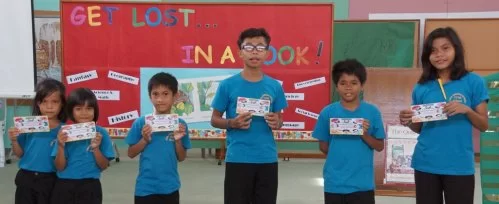 Reading challenge finished recently and the
winners took a trip to a local used bookstore and each got to choose a
cool book. All of the kids who participated in reading challenge are on
a field trip today to the local library.
Reading challenge finished recently and the
winners took a trip to a local used bookstore and each got to choose a
cool book. All of the kids who participated in reading challenge are on
a field trip today to the local library.
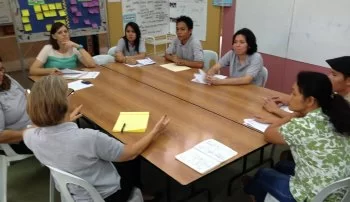 We
have completed our first quarter of school and conferences finished up
last week. The teachers shared about each of the students in their
class with the houseparents and select staff for three afternoons. It
was great to hear so many fun stories and positive things that
are happening in each classroom. We have a wonderful group of dedicated
teachers and it was exciting to spend time discussing the kids progress
with them.
We
have completed our first quarter of school and conferences finished up
last week. The teachers shared about each of the students in their
class with the houseparents and select staff for three afternoons. It
was great to hear so many fun stories and positive things that
are happening in each classroom. We have a wonderful group of dedicated
teachers and it was exciting to spend time discussing the kids progress
with them.

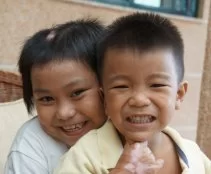
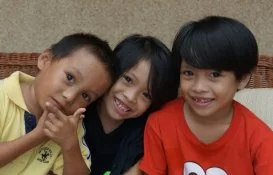
Three new students started this second quarter already and three more will be starting tomorrow. This is an unique and awesome thing about Cebu Children of Hope School. Kids can start school as soon as they are admitted to CSC. Exciting! Pray for our new kids and teachers as they adjust to their new school and classroom.
Keep checking back at our blogs to hear more stories and see more pictures of all the exciting happenings at CCHS! United Nations Day is fast approaching in October!
From Auntie Sandy's Retirement Party in Minnesota
Here are a couple of tributes from Auntie Sandy's retirement party in Minnesota on September 11.
Paul’s Speech
Why are we here tonight? That is my assigned topic as we get the program going tonight.
I want to paint two pictures for you tonight. Both represent endearing images for me for the ministry of CSC.
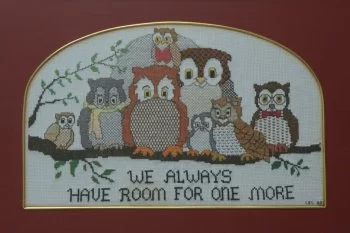 One is a cross stitch with a group of owls on a tree branch with these words stitched above them: “There’s always room for one more.” We have made that kind of a motto at CSC over the years. Although we have limits of space, manpower and budget, we always try to be open to making room for another child who needs us badly. This might be a malnourished child found in the street who might not survive another day without the lifegiving care of CSC, or an abused child badly needing the protection of a shelter. There is room for one more. Sandy’s heart is like that. It has an almost unlimited capacity to love more children. And when she loves you, that means that she remembers you, your personal information, your eventual adoptive parents, your accomplishments, everything. We are here tonight because of Sandy’s amazing heart, which has always inspired us at CSC to scoot over a little and let another child in.
One is a cross stitch with a group of owls on a tree branch with these words stitched above them: “There’s always room for one more.” We have made that kind of a motto at CSC over the years. Although we have limits of space, manpower and budget, we always try to be open to making room for another child who needs us badly. This might be a malnourished child found in the street who might not survive another day without the lifegiving care of CSC, or an abused child badly needing the protection of a shelter. There is room for one more. Sandy’s heart is like that. It has an almost unlimited capacity to love more children. And when she loves you, that means that she remembers you, your personal information, your eventual adoptive parents, your accomplishments, everything. We are here tonight because of Sandy’s amazing heart, which has always inspired us at CSC to scoot over a little and let another child in.
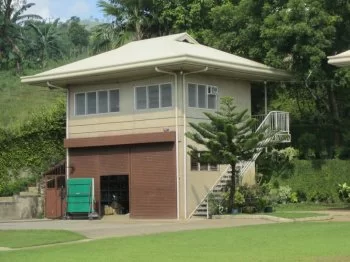 Another image that I have in my mind is a staircase. It is the staircase that leads up to Sandy’s office above the garage near the Cherne Home in Banawa. The stairs go up the side of the building and constitute a pretty good climb, especially for little ones. Hundreds and hundreds of children have made that fairly steep climb up to see Auntie Sandy. For some it was to have regularly scheduled counseling, or just to say hi and see if there might be a treat. It was worth the climb. But for many, climbing those stairs meant that the climber was in big trouble. If the house parents sent a child or children to see Sandy in her office, it was usually because of something fairly major that needed her attention. None of these kids hurried up the stairs. They knew that Auntie Sandy would be disappointed in them, that there would be repercussions for their behavior. Being in “big trouble” was never fun, and the stair leading up to her office certainly seemed long and steep.
Another image that I have in my mind is a staircase. It is the staircase that leads up to Sandy’s office above the garage near the Cherne Home in Banawa. The stairs go up the side of the building and constitute a pretty good climb, especially for little ones. Hundreds and hundreds of children have made that fairly steep climb up to see Auntie Sandy. For some it was to have regularly scheduled counseling, or just to say hi and see if there might be a treat. It was worth the climb. But for many, climbing those stairs meant that the climber was in big trouble. If the house parents sent a child or children to see Sandy in her office, it was usually because of something fairly major that needed her attention. None of these kids hurried up the stairs. They knew that Auntie Sandy would be disappointed in them, that there would be repercussions for their behavior. Being in “big trouble” was never fun, and the stair leading up to her office certainly seemed long and steep.
The person waiting at the top of the stairs was always loving and fair, and, when necessary, firm. She was and is a symbol for what CSC is about. We not only have room on our branch for many kids, but we strive to do our best to provide loving, compassionate care for all of them. That involves meeting their emotional and spiritual needs, but also, it means having rules and expectations. It means that we love them enough to discipline them, even when that is far from being fun. It means that, sometimes, they need to walk up that seemingly long flight of steps to see Auntie Sandy. Away from the other kids. Away from any other distractions. Just one on one with Sandy, and her loving heart. We are here tonight because for the past years Auntie Sandy was at the top of those stairs, doing her very best to encourage, instruct, love, correct, inspire, befriend and, yes, discipline and introduce them to the One who would enter their hearts and change their lives for eternity.
Cebu City is very much a Roman Catholic city.
Our Lady of the Sacred Heart and the Sacred Heart of Jesus are two of the most popular parishes in our city. In Banawa there is a parish that sort of combines these two, and is known as the The Alliance of Two Hearts Parish. If you have ever visited Cebu and CSC you have almost certainly driven by that church on your way between the CSC office and the Shelter in Banawa. With no disrespect to that parish, and without ascribing divinity where it is not merited, I would respectfully submit that CSC has, for the past 35 years, been the Alliance of Two Hearts: The heart of our Lord Jesus, whose perfect love is at the center of everything we do at CSC, and that finite, fallible but unfailing heart of Auntie Sandy that beats in such an inspiring way for the kids of CSC.
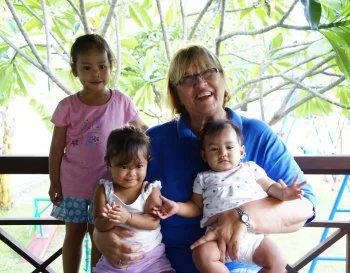 Bless you Auntie Sandy.
Bless you Auntie Sandy.
Marlys’s Speech
In 1962 Sandy and her family moved to this community, and started attending this church. My father was the pastor at the time so that is how we met and became close friends immediately. At that time Constance Evangelical Free was a small country church, located on the corner across the street.
Sandy and I were extremely active and often whispered and giggled during the service. My dad would stop right in the middle of the sermon to tell us to be quiet or move to the front pew. Our naughty behavior helped us to understand some of the rambunctious children that we would eventually care for at CSC.
We went to everything at church; Sunday school, Vacation Bible school, the youth group, and Camp Shamineau for retreats and summer camp. We went to some of the same schools and graduated from Anoka High school in the early 70’s. Sandy and I took several trips around the US and to the Canary Islands. We never dreamed in those days that we would be called by the Lord to be missionaries on the other side of the world.
When we were children playing together in Constance years ago who would have thought that we would spend 36 years side by side taking care of precious children in the Philippines?
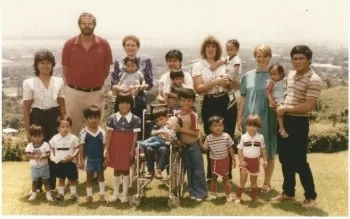
Working with Sandy has been a tremendous blessing, even in difficult times. We have had the privilege of working with many wonderful Filipinos that the Lord has called to be partners with us. Sandy was the Child Care Director and worked closely with all of our house parents and counselors, and trained our child care workers. Hundreds of children have been touched by her efforts and her dedication, and will never forget her unconditional love for them, including our daughters.
Sandy has always gone the extra mile to do what needed to be done, even if she worked 12 to 18 hour days, or more. It was a joy to travel around the island of Cebu with Sandy to visit children who were referred to CSC, and we spent countless hours taking care of sick children in the hospital or in our infirmary. In addition to being Auntie Sandy to all of the kids at CSC she also fulfills that role to adopted children here in the United States.
What a blessing that the Swanson family moved to Constance more than 50 years ago, and I’m so thankful that our friendship has lasted all these years. I can’t believe that the time has come for Sandy to retire, and I simply cannot imagine being in Cebu without her. One thing that will never change is our love and respect for her, and all of the wonderful memories will be in our hearts and minds for the rest of our lives. We give God all the praise and glory for using Sandy for the many years that she served at CSC.
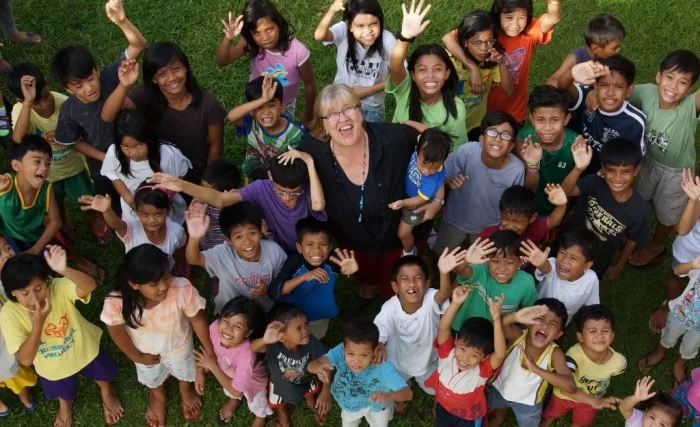 We love you, dear friend.
We love you, dear friend.
Chores
Everyday the kids do chores. Sometimes this means sweeping the grass, cutting the grass, watering the flowers, cleaning up after meals, laundry, or other random things. If kids are disobedient, unruly, or out of line, they may be assigned additional chores for a consequence. Some things don't change no matter where you are in the world! Another thing that doesn't change is how boring or agonizing chores can be...especially when you'd rather be playing with your friends.
The other day I caught a few girls making their chore of washing dishes after dinner just a little more bearable and perhaps even enjoyable...check it out:
Heroes
Last Friday was September 11, a pretty regular day at our school. American Studies, a class for the students who are matched with their adoptive families, was a bit pathetic because we were missing some members due to an outbreak of sore eyes, the Filipino version of pink eye. Since the numbers were down and we had a shortened class period for an all-school event in the afternoon, I was trying to decide how to spend the class time with only two students. Continuing with our study of famous Americans didn't seem like the best option. Teacher Amanda suggested maybe we should talk about 9/11 since it was the anniversary of the attack and it is a significant event the kids should at least be aware of. I took Amanda up on her suggestion. I already had material related to the topic and decided to read a realistic fiction story describing the event through the eyes of a young boy whose uncle was a NYC firefighter.
As we read the story I tried to fill in details and put the event in some sort of context for the girls. They barely know where New York is located much less anything that has happened there. I wasn't exactly sure how much they were actually comprehending because they were kind of quiet, but this was understandable considering the topic. I plowed ahead. After we read the story, which concluded with thoughts on heroism, I asked the girls if there was anyone they thought of as their heroes; someone they looked up to or had helped them in a significant way. Without much hesitation one of the girls said,"the aunties and uncles" and the other one said, "my mom and dad."
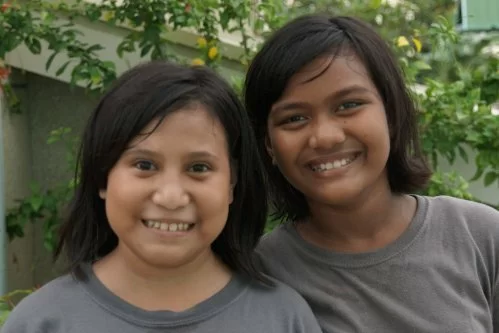 Well, I guess they got it. It was a bit hard not to cry right there, so I smiled.
Well, I guess they got it. It was a bit hard not to cry right there, so I smiled.




